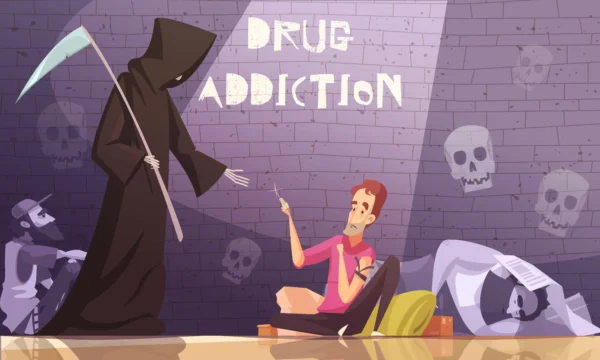- What Happens When You Use Crack Cocaine?
- How Long Does Crack Cocaine Stay in Urine?
- Why Is Crack More Addictive Than Cocaine?
- How Does Crack Cocaine Affect Your Body?
- Can Cocaine Kill You?
- How Much Cocaine Does It Take to Overdose?
- Is Cocaine Physically Addictive?
- How Long Does Cocaine Stay in Other Parts of the Body?
- Cocaine Addiction Treatment in 911 Detox Center
- Long-Term Effects of Cocaine Addiction
- How to Know When It’s Time for Treatment
- Conclusion: Take the First Step Toward Recovery
Crack cocaine is a fast-acting and highly addictive drug that can significantly impact both the mind and body. While the immediate high may last just minutes, its effects can linger in your system, posing risks to physical health and increasing the likelihood of addiction. For those battling cocaine addiction, understanding how the drug interacts with the body and seeking professional treatment is essential.
This article explores how long crack cocaine stays in your system, the factors affecting its detection, and the available treatment options. We also address common questions, such as “Why is crack more addictive than cocaine?” and “Can cocaine kill you?”
What Happens When You Use Crack Cocaine?
Crack cocaine is a concentrated version of cocaine processed into a solid, rock-like form, commonly used through smoking. This method delivers the drug rapidly to the brain, creating an intense but short-lived euphoric high. The effects often peak within minutes and last around 5-10 minutes, followed by a severe crash.
Once in the body, crack cocaine is broken down into metabolites, such as benzoylecgonine, which are later expelled through urine, sweat, or saliva. These metabolites can linger long after the high subsides, making drug tests capable of detecting use even days later.
How Long Does Crack Cocaine Stay in Urine?
Urine testing is a reliable method for detecting crack cocaine. Typically, the drug is detectable in urine for 1 to 4 days after use. In frequent or long-term users, the time frame for detection can increase significantly, sometimes lasting up to a week or even longer. Factors that influence this timeframe include:
- Frequency of Use: Repeated use leads to accumulation in the body, prolonging detection times.
- Hydration Levels: Dehydration can slow the excretion of metabolites.
- Individual Metabolism: Faster metabolic rates clear drugs more quickly.
These variations mean that even occasional users cannot predict exactly how long crack cocaine will remain detectable in their system.
Why Is Crack More Addictive Than Cocaine?
Both crack and powder cocaine have addictive potential, but crack is known to be significantly more addictive. The difference lies in how the drug is consumed and its effects on the brain.
Smoking crack delivers an immediate, intense high as the drug quickly enters the bloodstream and brain. This rapid onset creates a stronger reward signal, releasing high levels of dopamine—the “feel-good” neurotransmitter. However, this high is short-lived, lasting only a few minutes, which encourages frequent use to maintain the euphoric feeling. This cycle of quick highs and crashes increases the risk of developing cocaine addiction compared to snorted or injected cocaine.
How Does Crack Cocaine Affect Your Body?
Crack cocaine belongs to the class of stimulants, substances known to accelerate bodily functions and elevate activity in the central nervous system. Users often experience:
- Elevated Heart Rate and Blood Pressure: This reaction places extra strain on the cardiovascular system, increasing the risk of heart disease and related complications.
- Elevated Mood and Energy: Followed by irritability and exhaustion during the crash.
- Decreased Appetite: Prolonged use can lead to malnutrition.
Over time, these effects take a toll on the body. Chronic users face a heightened risk of heart attack, stroke, respiratory failure, and long-term neurological damage.
Can Cocaine Kill You?
The risks of cocaine are not just limited to addiction; the drug can be fatal. Cocaine-related deaths are often caused by:
- Heart Attack: Cocaine increases the heart’s workload, raising the risk of cardiac arrest.
- Stroke: Elevated blood pressure can lead to bleeding in the brain.
- Respiratory Arrest: In cases of overdose, the body may fail to maintain normal breathing.
Combining cocaine with other substances, such as alcohol or opioids, amplifies its dangers, further increasing the likelihood of a fatal overdose.
How Much Cocaine Does It Take to Overdose?
There is no “safe” amount of cocaine, and even small doses can cause fatal consequences. The amount needed to cause an overdose depends on individual factors like physical health, body mass, and level of tolerance to the drug. For first-time users, doses as small as 30-50 milligrams can lead to dangerous reactions. Chronic users may have higher tolerances but are not immune to overdose due to the cumulative damage cocaine inflicts on the body.
Is Cocaine Physically Addictive?
Yes, cocaine is physically addictive. Users often experience withdrawal symptoms when attempting to quit, including:
- Fatigue
- Intense Cravings
- Irritability or Depression
- Sleep Disturbances
In addition to its physical effects, cocaine is highly psychologically addictive. Users may develop compulsive behaviors, feeling unable to function without the drug. This combination of physical and mental dependence makes recovery challenging without professional help.
How Long Does Cocaine Stay in Other Parts of the Body?
- Blood: Trace amounts of cocaine are detectable in the bloodstream for up to 12 hours after consumption.
- Saliva: Detectable for 1-2 days.
- Hair: Can reveal cocaine use for months, as drug metabolites bind to hair follicles during growth.
These varying detection windows explain why medical professionals often rely on multiple tests to confirm cocaine use.
Cocaine Addiction Treatment in 911 Detox Center
For individuals struggling with cocaine addiction, seeking professional treatment is the first step toward recovery. At 911 Detox Center, we provide comprehensive care tailored to each patient’s needs. Our approach includes:
- Medical Detox: Safely managing withdrawal symptoms under the care of experienced professionals.
- Therapeutic Support: Evidence-based therapies like Cognitive Behavioral Therapy (CBT) help address the underlying causes of addiction and equip patients with coping strategies.
- Holistic Care: Incorporating mindfulness, yoga, and nutritional guidance promotes overall wellness.
- Aftercare Services: Long-term recovery is supported through group therapy, counseling, and relapse prevention strategies.
Our compassionate team understands the challenges of overcoming addiction and is committed to helping every patient reclaim their life.
Long-Term Effects of Cocaine Addiction
Chronic cocaine use has devastating long-term consequences, including:
- Cardiovascular Damage: Persistent high blood pressure and irregular heart rhythms can lead to heart failure.
- Neurological Impairments: Memory loss, difficulty concentrating, and mood disorders are common among long-term users.
- Mental Health Issues: Anxiety, paranoia, and depression are often worsened by prolonged use.
- Social and Financial Impact: Addiction often leads to strained relationships, job loss, and legal troubles.
Recognizing the signs early and seeking help can prevent these outcomes.
How to Know When It’s Time for Treatment
If you or a loved one shows signs of cocaine addiction, such as cravings, inability to quit, or withdrawal symptoms, it’s crucial to seek professional help. Cocaine addiction is a medical condition that requires specialized care.
Conclusion: Take the First Step Toward Recovery
Cocaine addiction is a serious condition, but recovery is possible with the right support. Understanding how long crack cocaine stays in your system and its effects on your body is only the beginning. If you or someone you know is battling cocaine addiction, don’t wait to seek help.
At 911 Detox Center, we’re here to guide you through every step of the recovery process. Explore our website to learn more about our programs, or contact us today to take the first step toward a healthier, drug-free future.
For more resources, continue browsing our blog for additional insights and information.




